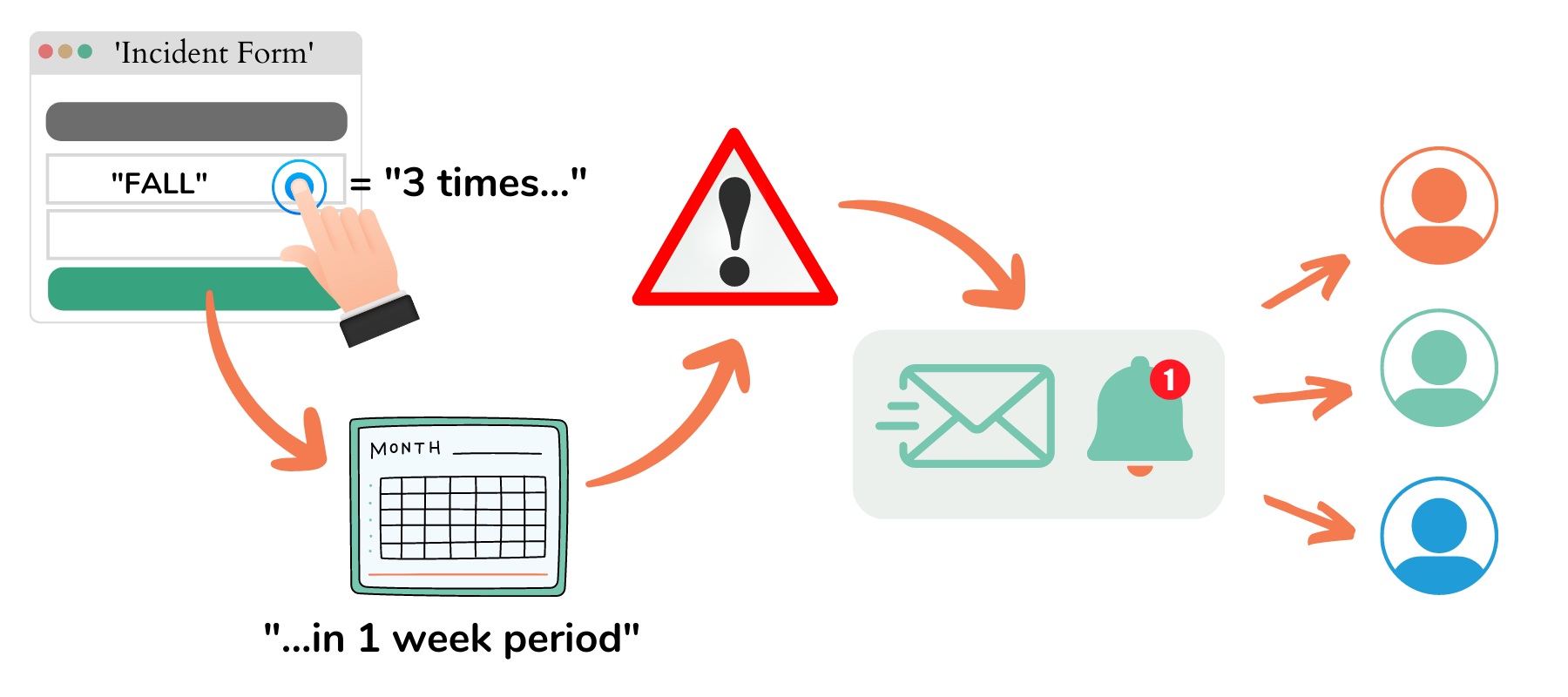What is covered in this post:
How rule-based AI improves care quality in organisations
MEG’s AI-powered ‘Smart Alerts’
Examples of Smart Alert workflows used by customers
What is rule-based AI?
Rule-based AI is a type of artificial intelligence that operates based on pre-set rules and conditions; designed to process large amounts of data, identify patterns, and make decisions based on predefined rules and logic. Unlike machine learning, rule-based AI is used where consistency and accuracy are critical.
Compared to other types of AI, such as machine learning and neural networks, rule-based AI is less flexible but more reliable in certain well-defined problem domains. It follows a predefined set of rules and doesn't require training data. While it may not be able to adapt to new situations, rule-based AI can be useful for automating routine tasks and reducing errors.
How rule-based AI improves care quality in organisations
Automate routine tasks
By automating routine tasks such as data entry and analysis, rule-based AI can help reduce human error and improve the accuracy and consistency of processes while freeing up time and resources for more critical tasks. In addition, healthcare providers can use rule-based AI to identify trends and patterns in data, such as exceeding risk tolerance levels, allowing organisations to make more informed decisions about interventions and quality improvement initiatives.
Improve accuracy and consistency
Rule-based AI can improve assurance of quality-related processes by applying a predetermined set of rules to each task, eliminating the potential for human error. In addition, it can ensure that each task is completed according to the same criteria and standards, reducing variability and increasing overall quality. This standardisation can ultimately lead to better quality care and improved patient outcomes.
Enhancing decision-making
By processing large amounts of data and applying predefined rules and logic, rule-based AI can provide early warnings and valuable insights into areas where healthcare providers can improve. These can help to identify potential risks or issues before they become more serious, allowing for early intervention and proactive decision-making.
Reducing errors and risk
The technology can also help to reduce the potential for human error, improving the safety and quality of care provided to patients, by automating routine tasks and applying consistent rules and logic.
Read on for examples of AI-powered use cases in MEG…
MEG’s AI-powered ‘Smart Alerts’
MEG’s most popular and impactful rule-based AI feature is called ‘Smart Alerts’. Smart Alerts help healthcare organisations identify potential risks or issues before they become more serious, allowing for early intervention and proactive decision-making.
Overview of the technology
MEG', ‘Smart Alerts’ simultaneously process data and apply predefined rules and decision trees to automatically identify potential high-risk scenarios (according to agreed thresholds) and trigger alerts to initiate real-time actions.
Specifically, these rules and decision trees automatically trigger an alert when certain criteria from a form are met (e.g. something happening 'X' times in a 'Y' time frame), allowing the system to make informed decisions based on established best practice.
Examples of Smart Alert workflows used by customers
Risk escalation decision support
Medication errors:
Example: In an incident report form if Category = Medicine is chosen 10 times within 3 weeks an alert is sent to a specific recipient(s)
Falls alert
Example: In an incident report form if ‘Category = Fall’ is chosen ‘3 times’ within ‘1 week’ an alert is sent to a specific recipient(s)
Patient Feedback Monitoring
Example: If ‘5 Patient Feedback forms’ are submitted with a ‘Poor Score’ within a ‘24- hour period’ an alert is sent to specific recipients(s)
Quality assurance workflow
Example: If the ‘Compliance %’ for a specific audit is ‘Below’ a threshold of ‘60%’ over a ‘30- day period’ an alert is sent to the Quality Assurance team
In summary, rule-based AI offers several benefits to healthcare providers, including automation of routine tasks, improved accuracy and consistency, enhanced decision-making, and reduced errors and risk. By leveraging the power of rule-based AI, healthcare organisations can improve patient care and operate more efficiently and effectively.
Benefits of Smart Alerts
MEG’s rule-based AI ‘Smart Alerts’ is live and ready to use right now…
Interested in learning more about how MEG's ‘Smart alerts’ and rule-based AI can benefit your healthcare organisation? We invite you to get in touch to learn how to get started - and experience the benefits for yourself!









